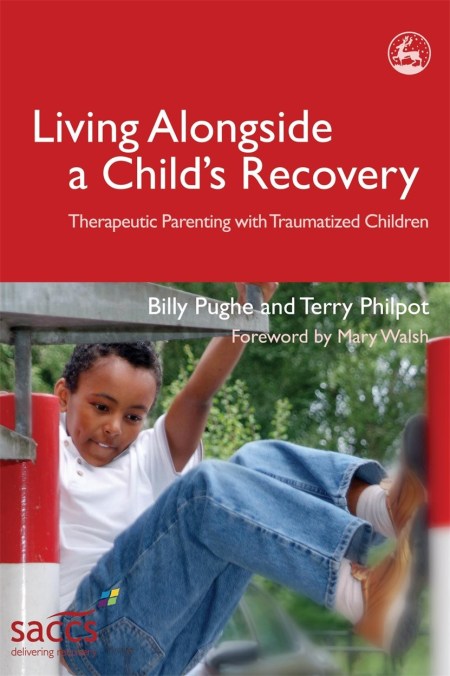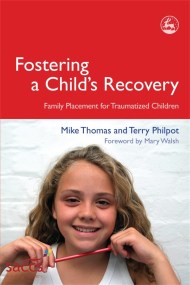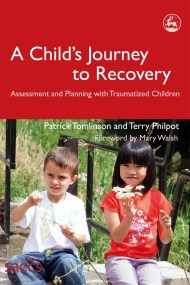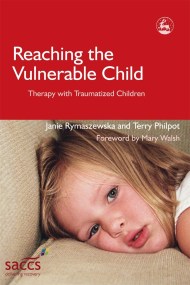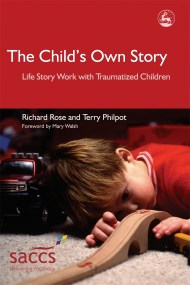Conventional parenting is not adequate to address the needs of children whose emotional development has been frozen, distorted or interrupted as a result of trauma. Therapeutic parenting is a psychodynamic model of parenting tailored for traumatized children, providing a safe, secure environment in which the traumatized child will have the best opportunity to recover.
Living Alongside a Child’s Recovery asserts that a good understanding of child development and attachment theory is essential to effective therapeutic parenting of a traumatized child, and the book details the roots of trauma as well as the impact this has on a child’s ability to maintain normal family bonds, whether with birth parents, foster parents or with staff in a residential setting. It also explains the practicalities of carrying out effective therapeutic parenting, including how to design a therapeutic physical environment, the importance of routine and security, how to approach issues of hygiene and organizing mealtimes. The authors examine individual and group work settings, and also explore transitions; how to manage a child’s move to a permanent placement while at the same time ensuring that their needs are prioritized.
This book forms part of SACCS’ integrated approach and is an ideal accompaniment to The Child’s Own Story: Life Story Work with Traumatized Children by Richard Rose and Terry Philpot and Reaching the Vulnerable Child: Therapy With Traumatized Children by Janie Rymaszewska and Terry Philpot, both of which also feature in the Delivering Recovery series.
Living Alongside a Child’s Recovery asserts that a good understanding of child development and attachment theory is essential to effective therapeutic parenting of a traumatized child, and the book details the roots of trauma as well as the impact this has on a child’s ability to maintain normal family bonds, whether with birth parents, foster parents or with staff in a residential setting. It also explains the practicalities of carrying out effective therapeutic parenting, including how to design a therapeutic physical environment, the importance of routine and security, how to approach issues of hygiene and organizing mealtimes. The authors examine individual and group work settings, and also explore transitions; how to manage a child’s move to a permanent placement while at the same time ensuring that their needs are prioritized.
This book forms part of SACCS’ integrated approach and is an ideal accompaniment to The Child’s Own Story: Life Story Work with Traumatized Children by Richard Rose and Terry Philpot and Reaching the Vulnerable Child: Therapy With Traumatized Children by Janie Rymaszewska and Terry Philpot, both of which also feature in the Delivering Recovery series.
Newsletter Signup
By clicking ‘Sign Up,’ I acknowledge that I have read and agree to Hachette Book Group’s Privacy Policy and Terms of Use
Reviews
This is a thoughtful and understanding insight into the needs of traumatised children. It should find its way onto the desks and into the mindset of many professionals... The book offers an adaptable model of care that can improve the resilience and wellbeing of young people traumatised through abuse... This is an important text with the potential to help develop or change practice and to influence how we plan and resource our efforts to help children recover.
This book is very practical. It describes in detail- and explains the rationale for - the SACCS approach. Pugh and Philpott discuss creating a therapeutic environment in the home, the process of bringing a child into placement, food, feeding and mealtimes. In addition, they consider the role of the key worker, how to meet a child's developmental needs and plan transition to a permanent placement. I feel inspired and moved by the work SACCS undertakes with some of the most fragile and damaged children in our society. I really hope that the methodology they employ is used to inform practice in training and in supporting foster carers and social workers.
An easy read with profound food for though which is part of a series through SACCS a member of The Charterhouse Group of Therapeutic Communities... A lively and informative look at therapeutic parenting which includes case studies and exercises to aid comprehension.
I thought this book was so good I wanted more information about the organisation behind it (SACCS) and the book series "Delivering Recovery" of which this is the third book.
